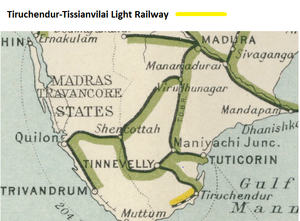Kulasekharapatnam Tissainvillai Light Railway
Kulasekharapatnam Tissianvillai Light Railway,
later known as the Kulasekharapatnam Light Railway
later to become the Tiruchendur-Tissianvilai Light Railway
History
The Kulasekharapatnam Tissianvillai Light Railway was established in 1914 linking the sugar growing area of Tissianvillai (modern day Tisaiyanvilai) to Kulasekharapatnam at the extreme end southern tip of India. [1]
The unassisted private 2ft/610mm narrow gauge(NG) line connecting Tissianvillai to the KPM Sugar Factory and on to Kulasekharapatnam Port, first carried goods in 1915-16 [2].
The line was originally constructed to carry jaggery (cane sugar) for the sole use of Parry & Company, the Managing Agents of the East India Distilleries and Sugar Factories Ltd, the owners of the KPM Sugar Factory. The maintenance and use of the line for the public was authorised on 14 June 1914 and the 18 mile(29km) section from Tissianvillai to the factory at Kulasekharapatnam opened on 8 July 1915 [3].
The South Indian Railway(SIR) encouraged 'Parry & Company' to extend the line to the SIR station at Tuticorn and open it for public use. The local Government authorised its use for public traffic commencing 1915 [4].
The line later was extended to Tiruchendur, a distance of 27 miles(43km) [5] with a short branch to Udangudi and there was a regular daily service for public use as indicated in Bradshaw's Guide Timetable for 1933 [6].
In 1926 the following is recorded "Messers. Parry and Company’s light Railway runs from Tiruchendur to Tissianvilai touching the port of Kulasekarapatnam, which has shipping connection with Colombo and Tuticorin" [7].
This line can be seen in yellow as a NG line on the 1931 Railway Map ‘Imperial Gazetteer of India,’ [8].
The line had been in decline since 1928 when the sugar factory at Kulasekharapatnam closed [4]
The line ceased operation in 1940 and its track was contributed as scrap to the war effort [5].
References
- ↑ Wikipedia "Kulasekharapatnam"; Retrieved 26 Oct 2016
- ↑ Digital South East Asia Library "Statistical abstract relating to British India from 1910-11 to 1919-20. No. 127.— Quantity of Goods and Minerals Conveyed by the several Railway Systems in India; in thousands of Tons"; Retrieved 26 Oct 2016
- ↑ " Administration Report on the Railways in India – corrected up to 31st March 1918"; Superintendent of Government Printing, Calcutta; page 249; Retrieved 26 Oct 2016
- ↑ 4.0 4.1 “Industrial Railways and Locomotives of India and South Asia” compiled by Simon Darvill. Published by ‘The Industrial Railway Society’ 2013. ISBN 978 1 901556 82-7. Available at http://irsshop.co.uk/India. Reference: Entry TN39 page ....
- ↑ 5.0 5.1 The Hindu Newspaper “Madras Miscellany” ; Retrieved 26 Oct 2016
- ↑ IRFCA "Bradshaw 1933 Timetable"; reproduced by Chris Pietruski, IRFCA Indian Railways Fan Club; Retrieved; 26 Oct 2016
- ↑ "llustrated Guide to the South Indian Railway – 1926"; page 133; Retrieved 26 May 2019
- ↑ Map ‘Imperial Gazetteer of India,’ v. 26, Atlas 1931 edition, Railways & Inland Navigation, p. 27; Retrieved 26 May 2019
